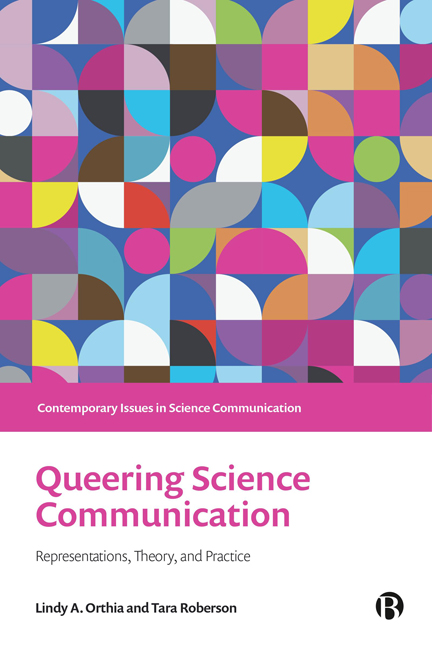Book contents
- Frontmatter
- Contents
- Series Editor Preface
- Notes on Contributors
- Acknowledgements
- Terminology and Sensitive Content in This Book
- Introduction
- PART I Negotiating Queer Identities with Science, Technology, and Medicine
- PART II Representations of Queerness in Public Science Communication
- PART III Queer People in Science Communication Communities
- PART IV Queering Institutional Science Communication Agendas
- Conclusions
- Index
Introduction
Published online by Cambridge University Press: 18 January 2024
- Frontmatter
- Contents
- Series Editor Preface
- Notes on Contributors
- Acknowledgements
- Terminology and Sensitive Content in This Book
- Introduction
- PART I Negotiating Queer Identities with Science, Technology, and Medicine
- PART II Representations of Queerness in Public Science Communication
- PART III Queer People in Science Communication Communities
- PART IV Queering Institutional Science Communication Agendas
- Conclusions
- Index
Summary
It seems appropriate that when we started to write the introduction for this book about queering science communication it was Mardi Gras season in Australia. Mardi Gras is an annual celebration of queer protest, liberation, and visibility that takes place in Australia's largest city, Sydney. Like many things queer, when Mardi Gras began life in 1978 it was with a long overdue burst of passionate outrage in the guise of fun, which resulted in police violence against queer people and many arrests. Since then, Mardi Gras has become a globally renowned tourist destination that injects millions of dollars into the economy, it is broadcast live on mainstream Australian television, and it has inspired many other queer events worldwide (Markwell, 2018).
As authors Alice Motion and Herve Sauquet describe in their contribution to this book, the Mardi Gras programme also now incorporates sciencethemed events, demonstrating that queer people are everywhere and science communication is relevant to everyone. Queer people face specific issues in the world of science and have unique contributions to make to science communication, so bringing ‘queer’ and ‘science communication’ together in dedicated events, products, and networks is an important part of queer protest, liberation, and visibility. We hope this book will serve those aims.
Yet an examination of the science communication research literature reveals that little has been published on the intersection between queerness and science communication over the past thirty years or more (Roberson and Orthia, 2021). This is despite the damage Western science has inflicted on queer people during its long history as self-appointed ‘expert’ on all things queer. Nor have queer people's protests against that damage made many academic headlines in science communication research. Even within the recent flurry of scholarly interest in equity, access, and diversity in science communication (Finlay et al, 2021), queer themes have thus far rarely rated a mention. Mardi Gras may have become mainstream, but there is still work to be done.
It is remarkable that it has taken until now for a book like this to exist. Anecdotal evidence points to a large number of lesbian, gay, bi+ , trans, gender diverse, non-binary, intersex, agender, asexual, aromatic, and queer (LGBTIQA+ ) people working in the science communication field and indeed being drawn to it from other fields of science and technology (Roberson and Orthia, 2021).
- Type
- Chapter
- Information
- Queering Science CommunicationRepresentations, Theory, and Practice, pp. 1 - 14Publisher: Bristol University PressPrint publication year: 2023

